_________________________________________________
Update From Pollitecon Publications
December 2017
_________________________________________________
Sign
up to receive Updates
Below are some of the numerous additions to the Pollitecon website
over the past few months.
Free Ebooks
There are many new books in Pollitecon’s Free
Ebooks Library.
Why Macedonia Should Not Compromise on its Name
Republic of Macedonia Erga Omnes is a paper by Jason Miko about why
Macedonians should not compromise on the name and should not have a
referendum on it. Mr Miko says that "Any compromise that Macedonia
makes on its name (through a referendum or other means) will fundamentally
alter the Macedonian identity, both inside and outside of the Republic
of Macedonia, extending to all who identify as Macedonians. This will
also extend to all that is currently named "Macedonian" –
the language, church, culture, currency, literature, sports, etc."
Mr Miko is a well known advocate for Macedonia and produced the international
documentary A Name is a Name. His paper is Here.
In Defense of the Macedonian Identity
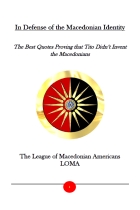 In
Defense of the Macedonian Identity by LOMA (The League of Macedonian
Americans) is subtitled The Best Quotes Proving that Tito Didn't Invent
the Macedonians but the subtitle does not do justice to how good the
quotes are nor to the calibre of the people who said them. These quotes
will inspire Macedonians everywhere and make them proud to be Macedonian.
The quotes will give them courage and the intellectual ammunition to
fight for their name, their identity and their heritage. The wide range
of people quoted includes well known historians, international statesmen,
Macedonian revolutionaries and historical figures, Greek sources, and
many others. The book is Here.
The paper book can be purchased from Amazon for US$16.99 with all proceeds
to be donated to the St. Mary's Macedonian Orthodox Church in Sterling
Heights, Michigan. See Here.
In
Defense of the Macedonian Identity by LOMA (The League of Macedonian
Americans) is subtitled The Best Quotes Proving that Tito Didn't Invent
the Macedonians but the subtitle does not do justice to how good the
quotes are nor to the calibre of the people who said them. These quotes
will inspire Macedonians everywhere and make them proud to be Macedonian.
The quotes will give them courage and the intellectual ammunition to
fight for their name, their identity and their heritage. The wide range
of people quoted includes well known historians, international statesmen,
Macedonian revolutionaries and historical figures, Greek sources, and
many others. The book is Here.
The paper book can be purchased from Amazon for US$16.99 with all proceeds
to be donated to the St. Mary's Macedonian Orthodox Church in Sterling
Heights, Michigan. See Here.
The Macedonian Founder of Skopje's Jewish Holocaust Museum
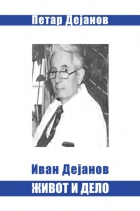 The
book Ivan Dejanov - Life and Work is the biography of the founder of
the Jewish Holocaust Museum in Skopje written by his son, Petar Dejanov.
Mr Dejanov senior was born in Bulgaria to a family of Macedonian immigrants
who, like many thousands of Macedonian families, had been expelled from
their native country between the two World Wars. In his town there co-existed
Bulgarians, Macedonians, Jews and Turks, and Ivan's father was part
of a small group who helped save local Bulgarian Jews from deportation.
Ivan grew up with Jews. The family returned to Macedonia in 1941, and
later Ivan achieved international professional success in medicine and
academia. He devoted the last 20 years of his life to supporting the
Jewish people who had suffered in World War II when 98 per cent of Macedonia's
Jews were sent to the death camps. Ivan's idea was the Holocaust Memorial
Center for the Jews of Macedonia, which he promoted among the Macedonian
and Jewish leadership. The book is in Macedonian and has many photographs
and historical documents. The book can be downloaded Here.
The
book Ivan Dejanov - Life and Work is the biography of the founder of
the Jewish Holocaust Museum in Skopje written by his son, Petar Dejanov.
Mr Dejanov senior was born in Bulgaria to a family of Macedonian immigrants
who, like many thousands of Macedonian families, had been expelled from
their native country between the two World Wars. In his town there co-existed
Bulgarians, Macedonians, Jews and Turks, and Ivan's father was part
of a small group who helped save local Bulgarian Jews from deportation.
Ivan grew up with Jews. The family returned to Macedonia in 1941, and
later Ivan achieved international professional success in medicine and
academia. He devoted the last 20 years of his life to supporting the
Jewish people who had suffered in World War II when 98 per cent of Macedonia's
Jews were sent to the death camps. Ivan's idea was the Holocaust Memorial
Center for the Jews of Macedonia, which he promoted among the Macedonian
and Jewish leadership. The book is in Macedonian and has many photographs
and historical documents. The book can be downloaded Here.
The Solun Assassins
Salonika under Turkish rule was a dramatic and revolutionary time for
the Macedonians. A new book in Pollitecon's Free Ebooks Library, The
Solun Assassins tells the story of some of the lesser known revolutionaries.
The Gemidzhii - boatmen or sailors - were a small group who wanted to
force the European Great Powers to give Macedonia the autonomy it had
been promised under the 1878 Berlin agreement. They dynamited a French
ship and blew up an Ottoman bank in Salonika.Their bombings and the
Solun assassinations were carried out several months before the Ilinden
Uprising and received the attention of the European public and diplomatic
circles. The book is by Krste Bitoski. It has been translated by Risto
Stefov, who says the book gives a different perspective of the Ilinden
Uprising. The Solun Assassins is Here.
The Macedonian version is Here.
The Legend of Bapchor
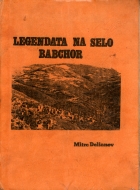 The
story of the famous but destroyed village of Bapchor in Aegean Macedonia
is told in the book Legendata na Selo Bapchor by Mitre Delianov. The
author was from Bapchor but migrated to Perth and wrote the book in
1976. At its height, Bapchor had over 2,000 villagers but it was bombed
and destroyed during the Greek Civil War. The 90 page book has a brief
history of the village and its people. It includes over 70 family names
and many photographs of the people, the village, the church and school.
There is also a section written by Sotir Grozovski on the difficult
times during the Civil War, and a list of 105 villagers who died during
the National Freedom Struggle and Greek Civil War from 1939 to 1948.
The book can be downloaded Here.
The
story of the famous but destroyed village of Bapchor in Aegean Macedonia
is told in the book Legendata na Selo Bapchor by Mitre Delianov. The
author was from Bapchor but migrated to Perth and wrote the book in
1976. At its height, Bapchor had over 2,000 villagers but it was bombed
and destroyed during the Greek Civil War. The 90 page book has a brief
history of the village and its people. It includes over 70 family names
and many photographs of the people, the village, the church and school.
There is also a section written by Sotir Grozovski on the difficult
times during the Civil War, and a list of 105 villagers who died during
the National Freedom Struggle and Greek Civil War from 1939 to 1948.
The book can be downloaded Here.
Prikaska za Bapchor
 The
book Prikaska za Bapchor begins with the autobiography of Georgi Stoichev,
who was born in the village of Bapchor in 1903. Georgi married a girl
from the nearby village of Visheni, but economic opportunities were
few and in 1929 he moved to Canada for work. But due to the Greek Civil
War his family was scattered around the world and, gradually, he put
his family back together. He returned to Bapchor in 1969 and saw that
it had been destroyed - "wiped from the map" during the war.
The book talks about the features and life in the village, and there
are many names of the families and individuals and where they lived.
The book has names of those who lost their lives in the Ilinden Uprising
and the Greek Civil War, as well as a list of children from Visheni
who were lost in the war. During his life Georgi visited Bapchori around
the world. Prikaska za Bapchor was published in Toronto in 1977. Thanks
to Ilo Ognenov from Perth for scanning the book and making it available.
The book is Here.
The
book Prikaska za Bapchor begins with the autobiography of Georgi Stoichev,
who was born in the village of Bapchor in 1903. Georgi married a girl
from the nearby village of Visheni, but economic opportunities were
few and in 1929 he moved to Canada for work. But due to the Greek Civil
War his family was scattered around the world and, gradually, he put
his family back together. He returned to Bapchor in 1969 and saw that
it had been destroyed - "wiped from the map" during the war.
The book talks about the features and life in the village, and there
are many names of the families and individuals and where they lived.
The book has names of those who lost their lives in the Ilinden Uprising
and the Greek Civil War, as well as a list of children from Visheni
who were lost in the war. During his life Georgi visited Bapchori around
the world. Prikaska za Bapchor was published in Toronto in 1977. Thanks
to Ilo Ognenov from Perth for scanning the book and making it available.
The book is Here.
The Misfortunes of Lukovtsi
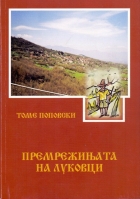 Premrezhinjata
na Lukovtsi (The Misfortunes of Lukovtsi) by Tome Popovski is the story
of the village of Lukovits near Voden in Aegean Macedonia. Mr Popovski
was born in the village in 1932 and writes his memories of the turbulent
years and the events that occurred during his childhood. But he starts
with the Ottoman period and the times leading up to the division of
Macedonia including schooling in the period. He says that after the
Balkan Wars the Macedonians "lost what they had before the Balkan
Wars: schools, churches, culture and customs." He says that when
the Greeks took over the village the first thing they did was build
a police station. The book discusses the Metaxas period, the Second
World War when the Germans entered the village, and the Greek Civil
War. He lists 23 village partizans who died in the Civil War and others
who were imprisoned. The book also talks about the suppression of the
Macedonian language, the decline of the population, and village characters
and stories. The book is Here.
Premrezhinjata
na Lukovtsi (The Misfortunes of Lukovtsi) by Tome Popovski is the story
of the village of Lukovits near Voden in Aegean Macedonia. Mr Popovski
was born in the village in 1932 and writes his memories of the turbulent
years and the events that occurred during his childhood. But he starts
with the Ottoman period and the times leading up to the division of
Macedonia including schooling in the period. He says that after the
Balkan Wars the Macedonians "lost what they had before the Balkan
Wars: schools, churches, culture and customs." He says that when
the Greeks took over the village the first thing they did was build
a police station. The book discusses the Metaxas period, the Second
World War when the Germans entered the village, and the Greek Civil
War. He lists 23 village partizans who died in the Civil War and others
who were imprisoned. The book also talks about the suppression of the
Macedonian language, the decline of the population, and village characters
and stories. The book is Here.
Monograph for the Village Turje and the Turjani
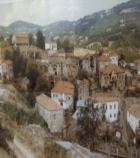 Monografija
za Seloto Turje i Turjani (Monograph for the Village Turje and the Turjani)
is about the village Turje near Lerin in Aegean Macedonian and the Turjani
villagers. The author Stojan Kochov was born in the village and gives
a personal view with many photographs of the village people, countryside,
houses, school, churches, weddings and graveyard. The book gives a brief
history of the village and its families, and some of the people mentioned
go back as far as the 1870s. There is also a brief autobiography of
Stojan, who has authored 24 books, and his family. The text is in Macedonian,
with some also in English and Greek. The monograph is Here.
Monografija
za Seloto Turje i Turjani (Monograph for the Village Turje and the Turjani)
is about the village Turje near Lerin in Aegean Macedonian and the Turjani
villagers. The author Stojan Kochov was born in the village and gives
a personal view with many photographs of the village people, countryside,
houses, school, churches, weddings and graveyard. The book gives a brief
history of the village and its families, and some of the people mentioned
go back as far as the 1870s. There is also a brief autobiography of
Stojan, who has authored 24 books, and his family. The text is in Macedonian,
with some also in English and Greek. The monograph is Here.
On the Macedonian Community in North America
The John Givens Story is sub-titled: My Family, the Macedonian Community
in Canada, and Controversies in the Development of the Macedonian Community
in North America. Mr Givens was from the village of Oshchima in Aegean
Macedonia and left when he was 14 due to the Civil War. For many decades
he has been a participant in the Macedonian community in Canada and
the United States and has held positions on the church board and president
of the United Macedonians of North America. He gives his own view as
an insider on the activities, growth and controversies of the communities
there including detailed discussion of church, community and political
organizations and relations. The book is in English but many chapters
are also in Macedonian. The book is Here.
Metodia Andonov-Chento
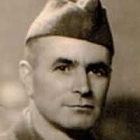 The
book Metodia Andonov-Chento by Fidanka Tanaskova highlights many unknown
or less known facts about the famous Macedonian leader and about the
period and political system in which he lived. He was born into a poor
family and as a youth worked as a labourer before rising to the top
of Macedonian politics. The book covers all the main stages of his life.
Ms Tanaskova is a well-known Macedonian journalist. The book is translated
from Macedonian to English by Risto Stefov. The English version is Here.
The Macedonian version is Here.
The
book Metodia Andonov-Chento by Fidanka Tanaskova highlights many unknown
or less known facts about the famous Macedonian leader and about the
period and political system in which he lived. He was born into a poor
family and as a youth worked as a labourer before rising to the top
of Macedonian politics. The book covers all the main stages of his life.
Ms Tanaskova is a well-known Macedonian journalist. The book is translated
from Macedonian to English by Risto Stefov. The English version is Here.
The Macedonian version is Here.
Recent Photos of Neret/ Polipotamos
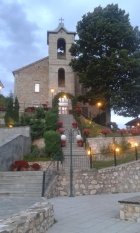 Over
30 recent photos of Neret show how beautiful and interesting the village
is. It is 16 kilometres by road from Lerin/ Florina, and is on a river
between two high mountains with spectacular views in every direction.
The houses are a mixture of very old and deserted and newly renovated
as people return to the village and do them up. The main problem in
the village is unemployment and under-employment. No doubt other villages
are the same. This is all the more reason why people should take an
interest in their ancestral villages, go for a holiday and spend some
money there, and think about how they can help their village to survive
and prosper. What the photos don't show are the many great characters
in the village - good-hearted people who welcome back family and friends
who left a long time ago with a hug, feast-like lunches and dinners,
and many good laughs. I'm proud that my family comes from such a beautiful
village with so many good people. The photos are Here.
Over
30 recent photos of Neret show how beautiful and interesting the village
is. It is 16 kilometres by road from Lerin/ Florina, and is on a river
between two high mountains with spectacular views in every direction.
The houses are a mixture of very old and deserted and newly renovated
as people return to the village and do them up. The main problem in
the village is unemployment and under-employment. No doubt other villages
are the same. This is all the more reason why people should take an
interest in their ancestral villages, go for a holiday and spend some
money there, and think about how they can help their village to survive
and prosper. What the photos don't show are the many great characters
in the village - good-hearted people who welcome back family and friends
who left a long time ago with a hug, feast-like lunches and dinners,
and many good laughs. I'm proud that my family comes from such a beautiful
village with so many good people. The photos are Here.
First Airbnb Home in Neret/ Polipotamos
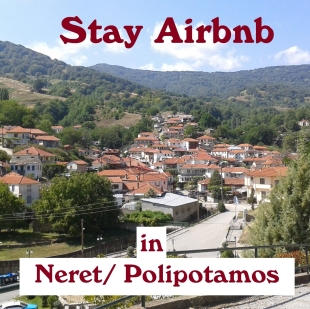
The first Airbnb house in Neret/ Polipotamos is now available to rent.
The property was developed by Perth businessman Jim Bivoltsis, who was
born in the village. The original stone house has been fully renovated
with modern bedrooms, kitchen, bathroom and laundry. It is one of the
first houses as you enter the village and is only a minute or two's
walk to the centre of the village, the main church and the two tavernas.
It is on the side of the hill with the river below and great forest
views across to the other side of the valley. There is wi-fi and offstreet
parking for two cars. There is more information Here.
Books by Other Publishers
Macedonia 2013: 100 Years After the Treaty of Bucharest
 The
United Macedonian Diaspora has published a 474-page book titled Macedonia
2013: 100 Years After the Treaty of Bucharest. The book features the
proceedings of UMD's 4th Annual Global Conference of the same name held
July 24 through August 2, 2013 in Skopje and Ohrid, Macedonia. Papers
were presented by 44 academics from 12 countries and representing the
University of Bucharest, University of Exeter, Oxford University, American
University, Jahja Kemal College, University of East Anglia, University
of Zurich, Western New England University, Institute for National History,
and University of Ss. Cyril and Methodius. The papers are included in
full in the book and address a wide range of topics from an analysis
of the events and war tactics of the Balkan Wars, the impacts of the
Treaty of Bucharest on contemporary politics, the challenges facing
the Republic of Macedonia, and the status of minority Macedonian populations
in other Balkan nations. The book was edited by Dr Natasha Garrett,
UMD Board Member and a director of International Student Services at
La Roche College. The book can be purchased Here.
The
United Macedonian Diaspora has published a 474-page book titled Macedonia
2013: 100 Years After the Treaty of Bucharest. The book features the
proceedings of UMD's 4th Annual Global Conference of the same name held
July 24 through August 2, 2013 in Skopje and Ohrid, Macedonia. Papers
were presented by 44 academics from 12 countries and representing the
University of Bucharest, University of Exeter, Oxford University, American
University, Jahja Kemal College, University of East Anglia, University
of Zurich, Western New England University, Institute for National History,
and University of Ss. Cyril and Methodius. The papers are included in
full in the book and address a wide range of topics from an analysis
of the events and war tactics of the Balkan Wars, the impacts of the
Treaty of Bucharest on contemporary politics, the challenges facing
the Republic of Macedonia, and the status of minority Macedonian populations
in other Balkan nations. The book was edited by Dr Natasha Garrett,
UMD Board Member and a director of International Student Services at
La Roche College. The book can be purchased Here.
Macedonians in America: Their Lives and Struggles during the 20th
Century
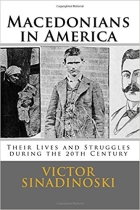 Macedonians
in America: Their Lives and Struggles during the 20th Century by Victor
Sinadinoski is the story of the Macedonian immigrants who journeyed
from the war-torn and impoverished Balkans to find freedom and fortune
in the United States. It includes well-known names like Vermont's Stoyan
Christowe and Michigan's Mike Ilitch as well as missionaries, coal miners,
track builders and bakery owners. The publisher says the book both educates
and entertains, and inspires admiration for the sacrifices that the
Macedonians made to better their lives in America while remaining committed
to their Macedonian identity and homeland. The book can be purchased
from Amazon Here.
Macedonians
in America: Their Lives and Struggles during the 20th Century by Victor
Sinadinoski is the story of the Macedonian immigrants who journeyed
from the war-torn and impoverished Balkans to find freedom and fortune
in the United States. It includes well-known names like Vermont's Stoyan
Christowe and Michigan's Mike Ilitch as well as missionaries, coal miners,
track builders and bakery owners. The publisher says the book both educates
and entertains, and inspires admiration for the sacrifices that the
Macedonians made to better their lives in America while remaining committed
to their Macedonian identity and homeland. The book can be purchased
from Amazon Here.
Australian-Macedonians and their Language(s)
The book "Three generations, two countries of origin, one speech
community: Australian-Macedonians and their language(s)" has now
been launched and is available for purchase. The author, Dr Jim Hlavac
is an academic at Monash University in Victoria. The book examines Macedonian
as a transposed, immigrant language in Australia. The study is based
on data from 103 speakers across three generations and two countries
of origin: northern Greece and the Republic of Macedonia. Dr Hlavac
says Macedonian-speakers in Australia have one of the highest levels
of language maintenance among Australia's ethnolinguistic minorities.
The book was launched by professor Victor Friedman. The book can be
purchased Here.
Canadian Macedonian Books
A reminder that Canadian Macedonian Books has a great selection of Macedonian
books in English from around the world. These include non-fiction, fiction,
children's and cook books. Canadian Macedonian Books is run by Virginia
Evans, a former co-president of the Canadian Macedonian Historical Society
and founder of the Macedonian Film Festival in Toronto. Canadian Macedonian
Books is Here.
Discount for Complete Set of Books
A reminder that a complete set of 12 Macedonian books published by Pollitecon
can be purchased at a discount of free postage in Australia and reduced
airmail postage overseas. See Here.
Sign
up to receive Pollitecon Updates
Thank you
Victor Bivell
Pollitecon Publications
PO Box 3411
Wareemba NSW 2046 Australia
Ph 02 9705 0578
Email vbivell @ pollitecon.com
Web http://www.pollitecon.com
More Updates

